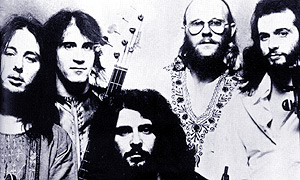| B i o g r a p h y |
 Gentle Giant
were a British prog-rock band which tried the most daring fusion of
jazz, classical and rock, in the golden age of the genre. The band was
formed by three brothers who had before joined some blues band in
Glasgow. The major point of strength of the sextet were Kenny Minnear’s electronic keyboards
(Minnear had a degree at the Royal Academy of Music), the guitar
playing by Gary Green (a blues
veteran) and Philip Schulman’s
winds. Besides their complex scores, their sound differed from other
bands especially for Derek Schulman’s
nearly inhuman singing, so aseptic that in some way resembles
Conservatory solfeggios and Gregorian chants.
Gentle Giant
were a British prog-rock band which tried the most daring fusion of
jazz, classical and rock, in the golden age of the genre. The band was
formed by three brothers who had before joined some blues band in
Glasgow. The major point of strength of the sextet were Kenny Minnear’s electronic keyboards
(Minnear had a degree at the Royal Academy of Music), the guitar
playing by Gary Green (a blues
veteran) and Philip Schulman’s
winds. Besides their complex scores, their sound differed from other
bands especially for Derek Schulman’s
nearly inhuman singing, so aseptic that in some way resembles
Conservatory solfeggios and Gregorian chants.
Gentle
Giant (Vertigo, 1970) proved the band’s uncertainty about which
genre to follow, since that period was the apex of the classical-like
progressive rock of King Crimson, Yes and Moody Blues and the end of
the psychedelic season; moreover, blues-rock jams were turning into
hard-rock songs. While Giant tries to capture the hearts and ears of
public through a soul-like theme, the lengthy Nothing At All is more
directed to brains with a tumultuous classic/folk/blues fantasy.The
dissonant counterpoint, the nearly eponymous peculiarity that made them
renowned , had his first appearance in Acquiring The Taste (Vertigo,
1971). Each of the six musicians alternatively played different
instrument, with a massive use of electronic keyboards that gave a
nearly symphonic feature to the album. Kenny Minnear played electric
piano, organ, mellotron, vibraphone, synthesizer, celesta and
harpsichord. Bass-player Ray Schulman played violin and viola, too,
while Tony Visconti, David Bowie’s producer, played the flute. At
least Pantagruel's Nativity, The House The Street The Room e Plain
Truth opened new horizons. Three Friends (Columbia, 1972) is probably
the first album wherein the band succeeded in expressing their ideas,
and it’s also less experimental than the previous record. Thought
as a "rock opera", it contains six long ballads. Mister Class And
Quality and Working All Day are the most accessible tunes while
Prologue, Schooldays e Peel The Paint are cryptic charmber-music songs.
The
symphonic sound of their second and third album is partially abandoned
in Octopus (Columbia, 1972), which had sometimes trace of hard-rock
(Advent Of Panurge), and folk-rock (Raconteur Troubadour, Think Of Me
With Kindness). But generally, it’s much more math-rock than
art-rock since every instrumental passages were provocations against
stereotypes. In particular, the vocal harmonies of Knots, inspired by
Laing’s enigmatic poems, were in antithesis to the British
tradition.
In A Glass House (1973), another concept album, is
probably their most ambitious work, with four lengthy songs as The
Runaway, Way Of Life, Experience, In A Glass House. This exuberant
experimentation took particularly advantage of Schulman’s
departure.
The socio-political concept album, The Power And The
Glory (Capitol, 1974) is less ambitious than the previous ones; despite
that, the music is still fluid and classy (Proclamation, Playing The
Game).
Free Hand (Capitol, 1975) is Gentle Giant’s
"medieval" album. Nearly all the songs (Just The Same, On Reflection,
Free Hand, Time To Kill, His Last Voyage) reached a formal perfection
in their attempt of renewing the form of the rock song.
Their classic period ended with Interview (Capitol, 1976), a concept
album against music industry.
Missing
Piece (Capitol, 1977), in fact, showed shorter songs and their sound
became more similar to hard-rock. Gentle Giant’s decline was
cruel and speedy, as proved by their last two miserable albums, Giant
For A Day (Capitol, 1978) and Civilian (Columbia, 1980).